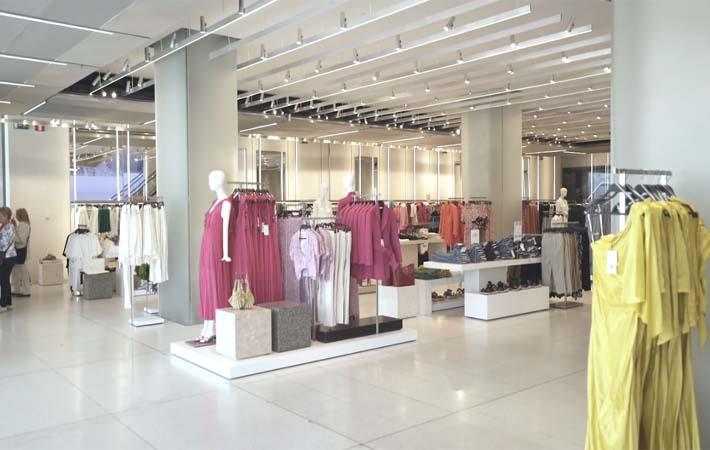Interviews
News Flash
Inditex to move to organic cotton, linen by 2025
21 Jul '19
5 min read

Pic: Inditex
Inditex has spelled out major sustainability targets which it aims to achieve in the near future. By 2025, it will only use cotton, linen and polyester that is organic, more sustainable or recycled. Cotton, linen and polyester –together with viscose, which will reach this target by 2023- constitute 90 per cent of the raw materials purchased by the group.
In addition, 80 per cent of the energy used in the group activities (stores, logistic centres and offices) will be renewable.
The sustainability goals were enumerated by Inditex’s executive chairman Pablo Isla at the Annual General Meeting in which shareholders ratified the group’s 2018 financial statements. In 2018, group revenue amounted to €26.15 billion, underpinned by growth in all the regions in which it does business, as well as in online sales, which accounted for 12 per cent of the total, having increased by 27 per cent last year. Net profit totalled €3.44 billion. These results paved the way for the payment of a dividend of €0.88 per share, a growth of 17 per cent year-on-year and of 83 per cent in the last five years.
“Our digital transformation and determined progress towards the most demanding sustainability standards are complementary and underpinned by the efficiency of our long-standing business model, which is based on offering our customers the best in quality fashion,” said Isla. He also highlighted that “sustainability is a never-ending task in which everyone here at Inditex is involved and in which we are successfully engaging all of our suppliers; we aspire to playing a transformational role in the industry”.
He said that by 2025 Inditex will only use cotton, linen and polyester that is organic, more sustainable or recycled. Use of cotton, linen and polyester –together with viscose, which will reach this target by 2023- constitute 90 per cent of the raw materials purchased by the Group. In addition, 80 per cent of the energy used in the Group activities (stores, logistic centres and offices) will be renewable.
The first milestone, set for 2019, is for all of the Group’s platforms and head offices to meet the highest green building certificates and for 100 per cent of Zara stores to be eco-efficient (which is one year ahead of the original target). In addition, the at-home used clothing collection service currently operating in several cities in Spain and China will be extended to Paris, London and New York by September.
Inditex will also complete the entire eco-efficient store platform by 2020. Zara will achieve this target in 2019, the rest of the brands will follow suit in 2020, assisted by the company’s effort to fine-tune and digitalise its sales footprint, he said.
This year, the Group’s Join Life garments will account for one-quarter of the total. Join Life is the label used by all of the Group’s retail formats to single out the use of more sustainable raw materials such as organic cotton, recycled polyester and tencel and the prioritisation of more water and energy friendly processes.
The volume of clothing featuring the Join Life label has already increased by 85 per cent in 2018 to 136 million garments. The Group is plans further significant growth in 2019 - of 110 per cent - and that by 2020 one in every four items of clothing put on sale will qualify for this sustainability label, he said.
Towards sustainability goal, use of plastic bags will end by 2020 by all of the Group’s brands, with Zara, Zara Home, Massimo Dutti and Uterqüe already having done so. In 2018, only 18 per cent of all bags were made from plastic. Next year, all of the Group’s stores will have been fitted with containers for collecting used clothing for subsequent charitable purpose reuse or recycling. The Clothing Collection programme is one of the cornerstones of Inditex’s circular economy effort.
That programme’s reach –in collaboration with a number of non-profit organisations- has increased to 24 markets; the 1,382 containers installed in the Group’s stores are complemented by the 2,000 street containers set up throughout Spain in collaboration with Caritas and the at-home pick up service operational nationwide in Spain. Since its launch, over 34,000 tonnes of garments, footwear and accessories have been collected through the dedicated containers placed in the company’s stores, offices and logistics platforms.
Complementing this programme is the strategic commitment to researching new technologies for developing new recycling processes. By 2023, the company will have fully eliminated single-use plastics from customer sales and 100 per cent of the waste generated at the Group’s head offices, logistics platforms and stores will be sent for recycling or reuse, framed by the Zero Waste programme.
Currently, the company is recycling or reusing 88 per cent of the waste. It will continue to introduce collection and recycling systems for all of the materials used in its package distribution and hanged garment operations (mainly FSC-certified cardboard boxes, recycled and recyclable plastic, alarms and hangers) for reuse within the supply chain itself or for recycling under the Green to Pack programme.
By 2023, another of the most widely used raw materials, viscose, will be 100 per cent sustainable.
“Our digital and sustainability transformation is only possible thanks to the solid business model performance, which is generating the funds needed to reinvest in the company’s future,” Isla said. He recalled that the company has invested over €9 billion during the last six years, over €2 billion of which has been earmarked to introducing technology designed to enhance the customer experience. (SV)
In addition, 80 per cent of the energy used in the group activities (stores, logistic centres and offices) will be renewable.
The sustainability goals were enumerated by Inditex’s executive chairman Pablo Isla at the Annual General Meeting in which shareholders ratified the group’s 2018 financial statements. In 2018, group revenue amounted to €26.15 billion, underpinned by growth in all the regions in which it does business, as well as in online sales, which accounted for 12 per cent of the total, having increased by 27 per cent last year. Net profit totalled €3.44 billion. These results paved the way for the payment of a dividend of €0.88 per share, a growth of 17 per cent year-on-year and of 83 per cent in the last five years.
“Our digital transformation and determined progress towards the most demanding sustainability standards are complementary and underpinned by the efficiency of our long-standing business model, which is based on offering our customers the best in quality fashion,” said Isla. He also highlighted that “sustainability is a never-ending task in which everyone here at Inditex is involved and in which we are successfully engaging all of our suppliers; we aspire to playing a transformational role in the industry”.
He said that by 2025 Inditex will only use cotton, linen and polyester that is organic, more sustainable or recycled. Use of cotton, linen and polyester –together with viscose, which will reach this target by 2023- constitute 90 per cent of the raw materials purchased by the Group. In addition, 80 per cent of the energy used in the Group activities (stores, logistic centres and offices) will be renewable.
The first milestone, set for 2019, is for all of the Group’s platforms and head offices to meet the highest green building certificates and for 100 per cent of Zara stores to be eco-efficient (which is one year ahead of the original target). In addition, the at-home used clothing collection service currently operating in several cities in Spain and China will be extended to Paris, London and New York by September.
Inditex will also complete the entire eco-efficient store platform by 2020. Zara will achieve this target in 2019, the rest of the brands will follow suit in 2020, assisted by the company’s effort to fine-tune and digitalise its sales footprint, he said.
This year, the Group’s Join Life garments will account for one-quarter of the total. Join Life is the label used by all of the Group’s retail formats to single out the use of more sustainable raw materials such as organic cotton, recycled polyester and tencel and the prioritisation of more water and energy friendly processes.
The volume of clothing featuring the Join Life label has already increased by 85 per cent in 2018 to 136 million garments. The Group is plans further significant growth in 2019 - of 110 per cent - and that by 2020 one in every four items of clothing put on sale will qualify for this sustainability label, he said.
Towards sustainability goal, use of plastic bags will end by 2020 by all of the Group’s brands, with Zara, Zara Home, Massimo Dutti and Uterqüe already having done so. In 2018, only 18 per cent of all bags were made from plastic. Next year, all of the Group’s stores will have been fitted with containers for collecting used clothing for subsequent charitable purpose reuse or recycling. The Clothing Collection programme is one of the cornerstones of Inditex’s circular economy effort.
That programme’s reach –in collaboration with a number of non-profit organisations- has increased to 24 markets; the 1,382 containers installed in the Group’s stores are complemented by the 2,000 street containers set up throughout Spain in collaboration with Caritas and the at-home pick up service operational nationwide in Spain. Since its launch, over 34,000 tonnes of garments, footwear and accessories have been collected through the dedicated containers placed in the company’s stores, offices and logistics platforms.
Complementing this programme is the strategic commitment to researching new technologies for developing new recycling processes. By 2023, the company will have fully eliminated single-use plastics from customer sales and 100 per cent of the waste generated at the Group’s head offices, logistics platforms and stores will be sent for recycling or reuse, framed by the Zero Waste programme.
Currently, the company is recycling or reusing 88 per cent of the waste. It will continue to introduce collection and recycling systems for all of the materials used in its package distribution and hanged garment operations (mainly FSC-certified cardboard boxes, recycled and recyclable plastic, alarms and hangers) for reuse within the supply chain itself or for recycling under the Green to Pack programme.
By 2023, another of the most widely used raw materials, viscose, will be 100 per cent sustainable.
“Our digital and sustainability transformation is only possible thanks to the solid business model performance, which is generating the funds needed to reinvest in the company’s future,” Isla said. He recalled that the company has invested over €9 billion during the last six years, over €2 billion of which has been earmarked to introducing technology designed to enhance the customer experience. (SV)
Fibre2Fashion News Desk – India
Popular News
Leave your Comments
Editor’s Pick
































-Ltd..jpg?tr=w-120,h-60,c-at_max,cm-pad_resize,bg-ffffff)





.jpg?tr=w-120,h-60,c-at_max,cm-pad_resize,bg-ffffff)
.jpg?tr=w-120,h-60,c-at_max,cm-pad_resize,bg-ffffff)






